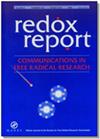The evolving role of long noncoding RNA HIF1A-AS2 in diabetic retinopathy: a cross-link axis between hypoxia, oxidative stress and angiogenesis via MAPK/VEGF-dependent pathway
IF 5.2
2区 生物学
Q1 BIOCHEMISTRY & MOLECULAR BIOLOGY
引用次数: 11
Abstract
ABSTRACT Background Diabetic retinopathy (DR) signifies a frequent serious diabetic complication influencing retinal structure and function. Dysregulation of lncRNAs drives a wide array of human diseases especially diabetes; thus, we aimed to study lncRNA HIF1A-AS2 role and its interplay with hypoxia, oxidative stress (OS), and angiogenesis in DR. Materials and methods 60 DM patients in addition to 15 healthy subjects. were enrolled. LncRNA HIF1A-AS2 mRNA relative gene expression was assessed. Hypoxia inducible factor 1-alpha (HIF-1α), vascular endothelial growth factor (VEGF), mitogen activated protein kinase (MAPK), and endoglin levels were assessed. Detection of DNA damage using comet assay, and Redox status parameters were also detected. Results LncRNA HIF1A-AS2 expression was significantly increased in diabetic patients with the highest levels in proliferative DR patients. Moreover, HIFα, VEGF, MAPK, and Endogolin levels were significantly higher in the diabetic patients compared to control group with the highest levels in in proliferative DR patients. Significant DNA damage in comet assay was observed to be the highest in this group. Conclusion We observed for the first time the imminent role of long noncoding RNA HIF1A-AS2 in DR throughout its stages and its interplay with hypoxia, OS, and angiogenesis via MAPK/VEGF-dependent pathway.长链非编码RNA HIF1A-AS2在糖尿病视网膜病变中的进化作用:通过MAPK/ vegf依赖途径在缺氧、氧化应激和血管生成之间形成交联轴
背景:糖尿病视网膜病变(Diabetic retinopathy, DR)是一种常见的严重糖尿病并发症,影响视网膜结构和功能。lncrna的失调驱动了一系列人类疾病,尤其是糖尿病;因此,我们旨在研究lncRNA HIF1A-AS2在dr中的作用及其与缺氧、氧化应激(OS)和血管生成的相互作用。材料和方法60例糖尿病患者和15例健康受试者。被录取。检测LncRNA HIF1A-AS2 mRNA相对基因表达。评估缺氧诱导因子1- α (HIF-1α)、血管内皮生长因子(VEGF)、丝裂原活化蛋白激酶(MAPK)和内激素水平。采用彗星法检测DNA损伤,并检测氧化还原状态参数。结果LncRNA HIF1A-AS2在糖尿病患者中表达明显升高,在增生性DR患者中表达最高。此外,糖尿病患者的HIFα、VEGF、MAPK和Endogolin水平明显高于对照组,其中以增生性DR患者的水平最高。在彗星试验中观察到显著的DNA损伤在该组中最高。我们首次观察到长链非编码RNA HIF1A-AS2在DR的各个阶段的潜在作用,以及它通过MAPK/ vegf依赖通路与缺氧、OS和血管生成的相互作用。
本文章由计算机程序翻译,如有差异,请以英文原文为准。
求助全文
约1分钟内获得全文
求助全文
来源期刊

Redox Report
生物-生化与分子生物学
CiteScore
6.10
自引率
0.00%
发文量
28
审稿时长
>12 weeks
期刊介绍:
Redox Report is a multidisciplinary peer-reviewed open access journal focusing on the role of free radicals, oxidative stress, activated oxygen, perioxidative and redox processes, primarily in the human environment and human pathology. Relevant papers on the animal and plant environment, biology and pathology will also be included.
While emphasis is placed upon methodological and intellectual advances underpinned by new data, the journal offers scope for review, hypotheses, critiques and other forms of discussion.
 求助内容:
求助内容: 应助结果提醒方式:
应助结果提醒方式:


